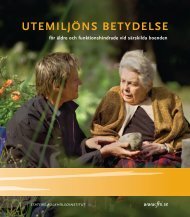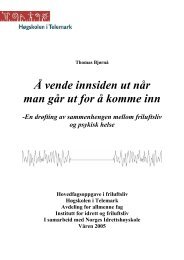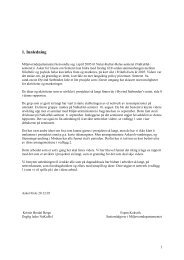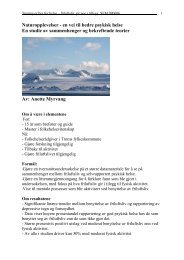Green Care: A Conceptual Framework - Frisk i naturen
Green Care: A Conceptual Framework - Frisk i naturen
Green Care: A Conceptual Framework - Frisk i naturen
Create successful ePaper yourself
Turn your PDF publications into a flip-book with our unique Google optimized e-Paper software.
Table 8.1: Sources of research evidence used in connection with green care<br />
116 <strong>Green</strong> <strong>Care</strong>: A <strong>Conceptual</strong> <strong>Framework</strong><br />
I. Effectiveness of specific green care interventions<br />
II. Benefits of the natural environment<br />
III. Benefits of a social environment<br />
IV. Physical activity and mental health<br />
V. Occupation, employment and health<br />
(and adverse effects of unemployment)<br />
VI. Physical activity and physical health<br />
VII. Psychological theories, constructs and frameworks<br />
Much supporting evidence has come from associated fields of research<br />
and has been used in the context of green care approaches. For example,<br />
the psychological theories of Kaplan and Kaplan (see Section 6) regarding<br />
attention restoration in the natural environment are frequently quoted in<br />
regards to therapeutic horticulture and other green care interventions. Other<br />
theories and constructs that have similarly been used with green care (or<br />
have relevance to it) are summarised in Section 6. Evidence from the other<br />
groups in the table is included throughout this report.<br />
8.2 Towards a paradigm shift – greening medical,<br />
psychiatric and social care<br />
Modern critiques of psychiatry clearly illustrate how technological and<br />
scientific progress has been accompanied by a loss of social, psychological<br />
and interpersonal awareness, described by Bracken and Thomas (2001)<br />
as ‘Postpsychiatry’. Bracken has since proposed that we are in the midst<br />
of a ‘mental health revolution’ (see RCP, 2008) which is being led by the<br />
service user and ‘recovery’ movements, and involves criticism of a solely<br />
instrumental approach, scrutiny of the nature of expertise and a reassertion<br />
of values, meanings and relationships as being of primary importance.<br />
Illich (1975) strongly criticised the way in which people’s bodily condition<br />
was made pathological and often worse by over-zealous medicalisation and<br />
“expropriation of their health”. .















